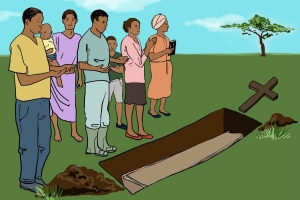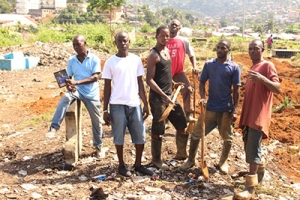
Caritas has worked with the World Health Organisation (WHO) on its burial guidelines in the wake of the Ebola epidemic. Credit: WHO
“I can’t imagine what it would be like to lose someone significant, like a grandfather, a parent or a child, and not be able to celebrate them in the ways they deserve,” says Michael Stulman of Catholic Relief Services, a Caritas member from the USA. CRS works with national Caritas organisations in Ebola-affected countries as part of the Church response. Stulman recently visited Sierra Leone and Liberia, where thousands of people have seen loved ones die of Ebola.
Since the Ebola crisis started, Caritas has worked with local governments, religious leaders, and the World Health Organisation to make sure that families of Ebola victims feel respected. When families feel that an ill or deceased loved one is not treated properly, “they hide the sick, they hide the corpses,” says Doctor Timothy Flanigan, a infectious diseases specialist and Catholic deacon who has been volunteering with Caritas in Liberia.
Before Ebola, funeral rites in the most-affected West African involved touching the corpse. Because the bodies of people who die of Ebola are still highly infectious, Caritas has been working to adapt local customs so that families can honor their dead and mourn them with dignity, but do not touch the bodies.
A “sacred ritual has been reduced to an impersonal process of men encased in protective gear whisking away bodies from the loving care of their families,” says Stulman. “This is heart-wrenching and frustrating for individuals, families and communities.”
Now in partnership with the International Federation of Red Cross and Red Crescent Societies (IFRC) and faith-based organisations including World Council of Churches, Islamic Relief, Caritas Internationalis and World Vision, the World Health Organisation (WHO) has updated its burial guidelines to reflect some of these concerns. The guidelines, which include coloured illustrations and advice for burial teams, talk about ways to preserve family’s dignity in their time of grief.
WHO quoted in their press release Monsignor Robert J. Vitillo, Special Health Advisor for Caritas Internationalis. “Giving the family an opportunity to view the body of the deceased, ensuring that the grave is appropriately labelled, and allowing religious leaders to offer prayers and family members the option to throw the first soil – these are important incentives for encouraging families to continue to find strength in their faith, and to keep other family members safe from becoming infected,” he said.

CRS provided funding to help rehabilitate this burial ground in Freetown, Sierra Leone, where workers are digging more than 40 graves per day. Photo by Maurice Boima / CRS.
The new guidelines have detailed instructions with labels like ‘Procedure for the dignified burial of a Muslim patient’, ‘Procedure for the dignified burial of a Christian patient,’ and so on. The guidelines include ways the family can participate in the burial without infecting themselves.
In Sierra Leone, Catholic Relief Services is establishing a command-and-control centre to manage safe and dignified burials in Port Loko. Community mobilisation teams also counsel grieving families.
A Red Cross leader described why respectful burials are so crucial. “We are becoming known for “dead body management”, but we do not “manage” dead bodies,” says Elhadj As Sy, Secretary General of the IFRC. “We safely, respectfully and in a dignified manner, accompany our deceased fellow human beings and help to prepare them, in accordance with their cultures, for their last resting places. It is in this spirit that our volunteers carry out their difficult work.”
Burials are for the grieving families a “final show of love and respect”, says Stulman. “To be told they cannot touch and care for the very people who helped shape their lives leaves a brutal scar on a people and a nation that has already lost so much.”
